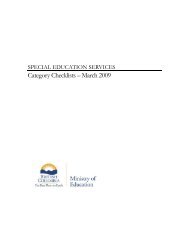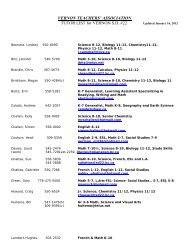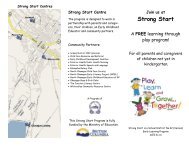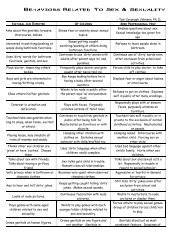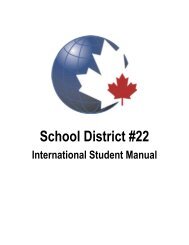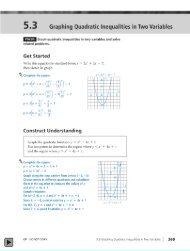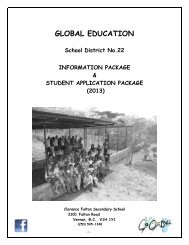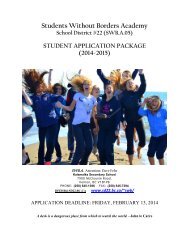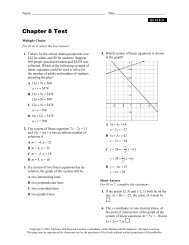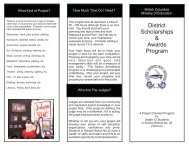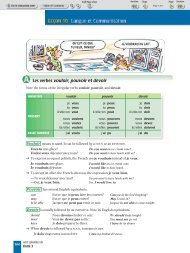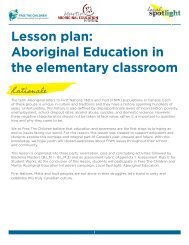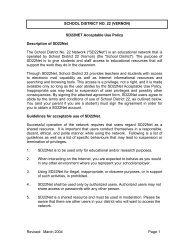War of the Eagles
War of the Eagles
War of the Eagles
You also want an ePaper? Increase the reach of your titles
YUMPU automatically turns print PDFs into web optimized ePapers that Google loves.
A NOVEL STUDY<br />
1
Novel Study Project<br />
This novel study project was developed by <strong>the</strong> Regional Vancouver Island<br />
Aboriginal Circle with <strong>the</strong> help <strong>of</strong> <strong>the</strong> Aboriginal Education Branch at <strong>the</strong><br />
Ministry <strong>of</strong> Education.<br />
Special thanks to Louise Spencer for her contributions.<br />
The goal <strong>of</strong> <strong>the</strong> novel study project was to create lessons incorporating<br />
Aboriginal literature and/or Aboriginal authors, while keeping in mind, <strong>the</strong><br />
Aboriginal learner.<br />
In order to best meet <strong>the</strong>se goals <strong>the</strong> lessons were designed to:<br />
• Respect <strong>the</strong> cultures <strong>of</strong> Aboriginal and non-Aboriginal people who may<br />
read and participate in <strong>the</strong>ses lessons.<br />
• To use a non-linear approach<br />
• To provide mix and match strategies that may be applied to many texts<br />
• To use graphic organizers whenever possible to accommodate <strong>the</strong><br />
inclusion <strong>of</strong> a diversity <strong>of</strong> learners<br />
• To provide opportunities to integrate English and Social Studies<br />
• To include elements <strong>of</strong> writing, inquiry , collaboration and reading in<br />
each lesson<br />
• To provide a set <strong>of</strong> question that can be used as prompts for discussion<br />
groups, journaling activities, comprehension or evaluation<br />
2
NOVEL SUMMARY<br />
<strong>War</strong> <strong>of</strong> <strong>the</strong> <strong>Eagles</strong><br />
A Novel By: Eric Walters<br />
ISBN 1-55143-099-1<br />
<strong>War</strong> <strong>of</strong> <strong>the</strong> <strong>Eagles</strong> is a multi-award winning novel based in Prince Rupert army<br />
base during World <strong>War</strong> II. It is <strong>the</strong> lives <strong>of</strong> two Canadian boys, one <strong>of</strong><br />
Tsimshian/Caucasian decent and his best friend <strong>of</strong> Japanese decent. This<br />
story is based on history and looks at <strong>the</strong> displacement <strong>of</strong> <strong>the</strong> Japanese and<br />
how each <strong>of</strong> <strong>the</strong> boys reacts. It involves a wounded eagle, wise elders,<br />
metaphors, integrity and cultural pride. An excellent read for grades 9 and up.<br />
It is probably nearly impossible to read this novel without including information<br />
about <strong>the</strong> war. A great series is “Band <strong>of</strong> Bro<strong>the</strong>rs” ( made for TV) and an<br />
excellent Japanimation film “Grave <strong>of</strong> <strong>the</strong> Fireflies”. I also find I use picture<br />
books such as “The Yellow Star”, by Carmen Agra Deedy and “Luba’s Story–<br />
Angel <strong>of</strong> Bergen Belsen, by Luba Tryszynska-Fredrick and Ann Marshall.<br />
ABOUT THE AUTHOR<br />
Eric was born in Toronto in 1957, which makes him “real old”. But, as Eric<br />
says, “Just because I have to grow old doesn’t mean that I have to grow up!”<br />
In his many roles as parent, teacher, social worker, youth sports coach and<br />
writer he is in constant contact with children and young adults. He draws from<br />
<strong>the</strong>se experiences and feels that this helps him to capture <strong>the</strong> realistic<br />
interaction between young people - <strong>the</strong> conflicts, tensions, stresses and<br />
interests that make up <strong>the</strong>ir lives.<br />
Eric began his writing as a teacher. He taught in classes from kindergarten up<br />
and his stories <strong>of</strong>ten reflect <strong>the</strong> curriculum that he was teaching. He always<br />
read stories - picture books and novels - to his students and this helped him to<br />
understand what children liked, responded to, and were inspired by. He enjoys<br />
<strong>the</strong> enthusiasm <strong>of</strong> his students and <strong>of</strong>ten looks at <strong>the</strong>m to provide him with <strong>the</strong><br />
inspiration to pursue a particular topic in both <strong>the</strong> classroom and in his writing.<br />
Prior to entering teaching and writing Eric was a social worker (B.S.W.,<br />
M.S.W., B.A. Hons. Psych). He worked in a variety <strong>of</strong> settings including child<br />
welfare, private practice, a mental health centre, and as a crisis worker in <strong>the</strong><br />
emergency department at a local hospital.<br />
RECOMMENDED GRADE LEVEL: 9 and up<br />
3
Teacher Reference Sheet<br />
<strong>War</strong> <strong>of</strong> <strong>the</strong> <strong>Eagles</strong><br />
STUDENT ACTIVITY 1: Word Splash<br />
• In groups, sort <strong>the</strong> words into groups that make sense to you. Give each<br />
group a title.<br />
• Glue <strong>the</strong>m onto your chart in categories.<br />
• Title your groups<br />
• Judging by <strong>the</strong> words on <strong>the</strong> word splash, where and when does <strong>the</strong> story<br />
take place ?<br />
• Predict <strong>the</strong> physical setting <strong>of</strong> <strong>the</strong> story.<br />
• Predict <strong>the</strong> time period setting <strong>of</strong> <strong>the</strong> story.<br />
• Each group presents one prediction.<br />
*Teacher note: Possible word categories.<br />
Characters<br />
Trees<br />
Groups <strong>of</strong> People<br />
Places<br />
4
Student Handout<br />
<strong>War</strong> <strong>of</strong> <strong>the</strong> <strong>Eagles</strong><br />
STUDENT ACTIVITY 1: Word Splash<br />
Douglas Fir<br />
Tsimshian<br />
Merchants<br />
Hemlock<br />
Ferns<br />
Germany<br />
Pride<br />
Bald Eagle<br />
Naani<br />
Jedediah<br />
Fungus<br />
Haida sailors<br />
Persecution<br />
Empty village<br />
Red Cedars<br />
Tadashi<br />
Fukushima<br />
Kaien Island<br />
British Columbia<br />
Soldiers<br />
Conflict<br />
Major<br />
Brown<br />
5
Student Handout<br />
<strong>War</strong> <strong>of</strong> <strong>the</strong> <strong>Eagles</strong><br />
STUDENT ACTIVITY : Emotions<br />
What do authors do to evoke emotions in readers? How comfortable do you<br />
feel reading <strong>the</strong> words <strong>of</strong> this writer?<br />
Look at <strong>the</strong> quotes:<br />
♦ Do <strong>the</strong>y spark any emotions?<br />
♦ What emotions is <strong>the</strong> character having?<br />
♦ Can you name those emotions?<br />
Discuss <strong>the</strong>se quotes and which emotions are being evoked from <strong>the</strong> author.<br />
Choose 2 more quotes from <strong>the</strong> novel and indicate emotion and add <strong>the</strong>m to<br />
<strong>the</strong> chart below.<br />
Sorrow? Disgust? Pride? Guilt?<br />
Quote:<br />
“Not that I would , but I could walk into<br />
any <strong>of</strong> <strong>the</strong> houses in our village and<br />
sit down at <strong>the</strong> kitchen table. Without<br />
a word someone would set ano<strong>the</strong>r<br />
place at <strong>the</strong> table.” page 8<br />
Responses:<br />
Comfortable , accepted: The<br />
character sees his culture as<br />
accepting and inclusive <strong>of</strong> all<br />
members <strong>of</strong> his community. I feel<br />
hopeful reading this and proud to be<br />
my culture. I am happy that this boy<br />
lives in a welcoming community.<br />
“When a Tsimshian dies, if he’s led a<br />
good life, he comes back to earth as<br />
an eagle or a raven or ano<strong>the</strong>r one <strong>of</strong><br />
<strong>the</strong> creatures <strong>of</strong> <strong>the</strong> forest or ocean.<br />
My fa<strong>the</strong>r tells me not to believe<br />
everything I’m told, not to get caught<br />
up in that ‘Indian mumbo-jumbo’.”<br />
page7<br />
6
Student Handout<br />
My grandmo<strong>the</strong>r can’t read or write.<br />
That doesn’t stop her from being a<br />
storyteller and <strong>the</strong> keeper <strong>of</strong> our<br />
clan’s history. She knows about<br />
everything and everybody... Naani is<br />
also a medicine woman. She knows<br />
about <strong>the</strong> herbs and plants growing<br />
in <strong>the</strong> forest.” page 9<br />
“She peeled <strong>the</strong> skin away from <strong>the</strong><br />
carcass. The pelt parted from <strong>the</strong><br />
flesh with a tearing sound.” page 10<br />
7
Teacher Reference Sheet<br />
The purpose <strong>of</strong> this lesson:<br />
Finding quotes in text in preparation for essay writing. I call this, ga<strong>the</strong>ring<br />
evidence so that <strong>the</strong> students understand how to use <strong>the</strong> author’s words to<br />
back up <strong>the</strong>ir opinions.<br />
Objectives:<br />
To practice scanning text.<br />
To hear peers read parts <strong>of</strong> text aloud.<br />
<strong>War</strong> <strong>of</strong> <strong>the</strong> <strong>Eagles</strong><br />
STUDENT ACTIVITY 3: Reading Characters Emotions<br />
8
Student Handout<br />
<strong>War</strong> <strong>of</strong> <strong>the</strong> <strong>Eagles</strong><br />
STUDENT ACTIVITY 3: Reading Characters Emotions<br />
How does Jedediah feel about <strong>the</strong>se things? Can you tell? How?<br />
Write evidence (quotes) from <strong>the</strong> novel that help you understand <strong>the</strong> character’s<br />
emotions.<br />
9
Student Handout<br />
10
Student Handout<br />
<strong>War</strong> <strong>of</strong> <strong>the</strong> <strong>Eagles</strong><br />
STUDENT ACTIVITY 4: Extensions<br />
- Transfer one topic to a T-chart.<br />
- Write a paragraph about how Jedediah or ano<strong>the</strong>r character feels about<br />
something. Use evidence from <strong>the</strong> text that makes you believe that.<br />
Or<br />
-Write a biographical poem about Jedediah or ano<strong>the</strong>r character from <strong>the</strong><br />
story.<br />
Biographic-Poem<br />
Name:<br />
Three traits:<br />
Related to:<br />
Who cares deeply about:<br />
Who feels:<br />
Who needs:<br />
Who gives:<br />
Who fears:<br />
Who would like to see:<br />
11
Teacher Reference Sheet<br />
<strong>War</strong> <strong>of</strong> <strong>the</strong> <strong>Eagles</strong><br />
STUDENT ACTIVITY 5: Gallery walk<br />
Gallery walks can be used as a lesson opener, for debriefing<br />
or at anytime to create discussion and movement.<br />
• Grandparents are essential to our a society.<br />
• Having friends from ano<strong>the</strong>r culture enriches our lives.<br />
• We all should have <strong>the</strong> right to choose what we eat.<br />
• Your friend’s parents should have <strong>the</strong> right to parent you.<br />
• Cities are too busy to live in.<br />
• Moving a lot builds character.<br />
• Small towns are full <strong>of</strong> ‘hicks’.<br />
*Teachers: Perhaps do 3-4 at a time, as a focus lesson.<br />
Gallery Walk instructions on <strong>the</strong> following page.<br />
12
Student Handout<br />
<strong>War</strong> <strong>of</strong> <strong>the</strong> <strong>Eagles</strong><br />
STUDENT ACTIVITY 5: Gallery Walk<br />
Complete a gallery walk using all statements<br />
or<br />
Draw a rating scale <strong>of</strong> one to four and have students place <strong>the</strong>ir initials on <strong>the</strong><br />
line to indicate <strong>the</strong>ir opinion on <strong>the</strong> following statements<br />
Tsimshian Beliefs<br />
• The beach is <strong>the</strong> place to live.<br />
Strongly disagree<br />
Strongly agree<br />
1 2 3 4<br />
• Never venture too far into <strong>the</strong> forest nor too far out to sea.<br />
Strongly disagree<br />
Strongly agree<br />
1 2 3 4<br />
• The ocean and <strong>the</strong> forest are inhabited by spirit creatures which take<br />
on <strong>the</strong> form <strong>of</strong> animals.<br />
Strongly disagree<br />
Strongly agree<br />
1 2 3 4<br />
• Creatures are mostly good and even playful.<br />
Strongly disagree<br />
Strongly agree<br />
1 2 3 4<br />
• Creatures who are provoked or shown disrespect can be malicious<br />
or even deadly.<br />
Strongly disagree<br />
Strongly agree<br />
1 2 3 4<br />
13
Student Handout<br />
<strong>War</strong> <strong>of</strong> <strong>the</strong> <strong>Eagles</strong><br />
STUDENT ACTIVITY 5: Gallery Walk<br />
♦<br />
♦<br />
♦<br />
♦<br />
♦<br />
♦<br />
All is fair in love and war.<br />
<strong>War</strong> is sometimes necessary.<br />
Immigrants to Canada should have special identity cards.<br />
Home is where <strong>the</strong> heart is.<br />
People should be allowed to fight on whatever side <strong>the</strong>y want.<br />
You must sacrifice something in order to win.<br />
Group Question:<br />
What do you think politicians such as Stephen Harper and George Bush, or<br />
dead ones such as Winston Churchill think or thought about war?<br />
Review <strong>the</strong> statements. Answer <strong>the</strong>m again from one <strong>of</strong> <strong>the</strong> politicians points<br />
<strong>of</strong> view.<br />
14
Student Handout<br />
<strong>War</strong> <strong>of</strong> <strong>the</strong> <strong>Eagles</strong><br />
STUDENT ACTIVITY 5: Gallery Walk<br />
• Choose a topic from one <strong>of</strong> <strong>the</strong> gallery walks or four corners activities.<br />
• Use <strong>the</strong> graphic organizer to sort out your thoughts. Write your <strong>the</strong>sis<br />
statement and <strong>the</strong>n think <strong>of</strong> points to help you write persuasively. Try to<br />
help <strong>the</strong> reader to understand your point <strong>of</strong> view.<br />
• Remember that essays are like telling someone what you think <strong>of</strong> <strong>the</strong><br />
topic.<br />
• Using quotes from o<strong>the</strong>r people can only help to support your opinion.<br />
• Make your topic into a statement that suits you. For example:<br />
Could be changed to:<br />
Racism is alive and well in Canada<br />
Canadians are working hard to eliminate racism<br />
15
Student Handout<br />
Literature Circles Discussion Questions<br />
Chapters 1– 2<br />
1) What motivated Tadashi to say that he was Canadian at that time? Did<br />
Tadashi have o<strong>the</strong>r ways he could have reacted? Why did he choose to<br />
say something?<br />
2) What motivates people to name call? Why do people stereo-type? Is<br />
name calling part <strong>of</strong> your culture?<br />
3) Do you think people should carry guns around today? How about during<br />
<strong>the</strong> time <strong>of</strong> war?<br />
4) Why are <strong>the</strong> guards so suspicious <strong>of</strong> Jedediah?<br />
Chapter 3<br />
5) What do you suppose <strong>the</strong> life <strong>of</strong> a fighter pilot was really like? Why does<br />
Jed’s mo<strong>the</strong>r not believe <strong>the</strong> content <strong>of</strong> <strong>the</strong> letter from Jed’s fa<strong>the</strong>r?<br />
6) Why was <strong>the</strong>re an army base in Prince Rupert anyway?<br />
7) If <strong>the</strong> dad is Canadian, why is he fighting in Europe?<br />
8) Who were Canada’s enemies and who were it’s allies during <strong>the</strong> war?<br />
9) In your opinion was Jed’s dad fighting for a good reason?<br />
Chapter 4 - 5<br />
10) Why did <strong>the</strong> author recognize <strong>the</strong> eagle’s story as an important one to<br />
tell? Why not a story about a rabbit or a sparrow?<br />
11) Why do <strong>the</strong> elders in Tadashi’s community talk about who <strong>the</strong> kids should<br />
marry ? Why do you think it comes up in <strong>the</strong> novel?<br />
Chapter 6<br />
12) Reread pages 72-73. How does Smitty view elders? What nationality do<br />
you think Smitty is? Are <strong>the</strong>se things connected? How did Smitty change<br />
his tune after he realized that his words had been heard?<br />
13) Do you agree with Bart’s analysis <strong>of</strong> ‘native’ people? How about ‘white’<br />
people?<br />
14) What is a stereo-type?<br />
16
Student Handout<br />
Chapter 7<br />
15) Why was Major Brown so delighted with Jed’s answer, “ It wouldn’t be<br />
right for me to give you an answer without knowing more.” ? Was this a<br />
usual answer for a teenager?<br />
16) Do you think Major Brown is a good leader? Is he a good character? Are<br />
<strong>the</strong> two onnected?<br />
17) Why do you suppose <strong>the</strong> Major has called in George Star, <strong>the</strong> Tsimshian<br />
Elder, to meet with him about <strong>the</strong> group fight?<br />
18) Why is Major Brown inviting Jed? He’s just a kid.<br />
19) What different approach do Major Brown and Jedediah’s mo<strong>the</strong>r have<br />
regarding <strong>the</strong> serving <strong>of</strong> pie at <strong>the</strong> meeting? How did Major Brown react to<br />
her point <strong>of</strong> view? Were <strong>the</strong>ir different styles cultural?<br />
20) Do you like Major Brown’s character? How about Jedediah’s mo<strong>the</strong>r?<br />
How do authors get you to like <strong>the</strong>ir characters?<br />
21) What is ironic about Naomi yelling, “Hey Major! Can you bring ano<strong>the</strong>r<br />
cup <strong>of</strong> c<strong>of</strong>fee–black– plenty <strong>of</strong> sugar!” ? ( page 88)<br />
22) How do you think Major Brown is feeling when he commented to George<br />
Star, “The Commander left. You are almost an hour late.” (page 89)<br />
How about George? Why?<br />
23) Who is responsible for <strong>the</strong> people drinking ?<br />
24) Do you agree with George or <strong>the</strong> Major that <strong>the</strong> Aboriginal People had<br />
already been invaded 100 years earlier? What do you know about that?<br />
25) Should Major Brown be worried about what’s going on in Asia?<br />
What about George Bush worrying about what’s going on in Iraq? Are <strong>the</strong><br />
situations similar or not? What is your philosophy about war? What is<br />
your philosophy about involvement <strong>of</strong> o<strong>the</strong>r countries?<br />
26) Do you think Major Brown was disrespectful?<br />
27) Why does George talk about <strong>the</strong> eagle that he sees in <strong>the</strong> yard? What<br />
significance does this conversation have?<br />
28) What different beliefs do George Star and Major Brown have around<br />
problem solving? How do you think this problem could best be solved?<br />
17
Student Handout<br />
Chapter 8<br />
29) What was Tadashi’s fa<strong>the</strong>r specifically meaning when he talked to Jed<br />
privately on he way home? How did you feel about what he said to Jed?<br />
How do you think Jed felt about what <strong>the</strong> fa<strong>the</strong>r said?<br />
30) Does any stereo-typing go on in this chapter? By whom?<br />
Chapter 9<br />
31) Do you think it’s harder to marry someone from ano<strong>the</strong>r culture?<br />
32) Should Midori’s parents have a say in who she should marry? Do you<br />
think you will want your parent’s approval on who to marry? Who is<br />
Tadashi’s fa<strong>the</strong>r most concerned about?<br />
33) Why did Jed respond angrily when his grandma suggested he may feel<br />
“in <strong>the</strong> middle<strong>of</strong> two cultures” ?<br />
Chapter 12<br />
34) How do different people show remorse?<br />
35) How can people make amends?<br />
36) Is it your fault if o<strong>the</strong>rs don’t understand your intentions?<br />
37) How should Jed fix this conflict he’s having with his Japanese friends?<br />
38) What do you think about what <strong>the</strong> teacher said to <strong>the</strong> class about <strong>the</strong><br />
Japanese? What would you do if a teacher said something such as that<br />
now-a-days?<br />
39) Why does <strong>the</strong> <strong>of</strong>ficer give Jed <strong>the</strong> guns back?<br />
40) Why does Jed say he’s not ‘Indian’?<br />
41) Why does Tadashi’s fa<strong>the</strong>r not want Jed to see what’s happening in his<br />
house?<br />
18
Student Handout<br />
Chapter 13, 14, 15<br />
42) How do you feel about caged animals? How about zoos? How about pet<br />
stores? How about fish bowls? Is it wrong to keep a bird caged? What<br />
about a whale? A dog? A goldfish? Do you think animal laws are really<br />
necessary?<br />
43) What probably would have happened to <strong>the</strong> eagle had it been found<br />
today?<br />
44) Why was <strong>the</strong>re such a mass movement <strong>of</strong> <strong>the</strong> Japanese people? Was it<br />
just? Why did <strong>the</strong> government move all <strong>of</strong> <strong>the</strong> people to <strong>the</strong> interior <strong>of</strong><br />
B.C. and take all <strong>of</strong> <strong>the</strong>ir belongings? What do you think about all <strong>of</strong> that<br />
happening in Canada?<br />
45) Do you suppose Tadashi will be back in his ‘home soon’? Have you<br />
ever had to part from a friend?<br />
Chapter 16<br />
46) Do you think <strong>the</strong> boys did <strong>the</strong> right thing with <strong>the</strong> eagle? Why is this final<br />
deed <strong>of</strong> Jed and Tad’s important to <strong>the</strong> story?<br />
47) What is <strong>the</strong> purpose <strong>of</strong> Jed thinking about his Naani during <strong>the</strong> eagle<br />
release?<br />
Chapter 17<br />
48) How does <strong>the</strong> author build emotion when Jed finds <strong>the</strong> buck he has just<br />
shot? Do you think you could have shot <strong>the</strong> buck a second time? How<br />
about <strong>the</strong> first time? Have you ever been really starving?<br />
49) Who would be a good hunter in your group if you were relying on your<br />
resources to get food? Who would be <strong>the</strong> ga<strong>the</strong>rer <strong>of</strong> berries or<br />
mushrooms? Who would prepare <strong>the</strong> food? In your family who could do<br />
<strong>the</strong>se roles?<br />
50) Why does <strong>the</strong> writer mention that <strong>the</strong> three men from <strong>the</strong> boat were<br />
drinking?<br />
Chapter 18<br />
51) Why does <strong>the</strong> Major take a break from his meeting to listen to Jed? Why<br />
is it important to <strong>the</strong> character development <strong>of</strong> <strong>the</strong> Major? How is it<br />
important to <strong>the</strong> development <strong>of</strong> Jed’s character?<br />
19
Student Handout<br />
Chapter 18 continued:<br />
52) What can Jed do for Tadashi?<br />
53) Is <strong>the</strong> Major right? Could he do anything? Can we do anything now-adays<br />
if we see an injustice being done? What can we do?<br />
54) Does anyone in <strong>the</strong> group know about <strong>the</strong> Holocaust in World <strong>War</strong> II?<br />
20
Teacher Reference Sheet<br />
<strong>War</strong> <strong>of</strong> <strong>the</strong> <strong>Eagles</strong><br />
STUDENT ACTIVITY 6: Mind-Mapping<br />
The research process is <strong>the</strong> focus <strong>of</strong> this mind-mapping activity.<br />
Write each topic on index cards and tell <strong>the</strong>m to use <strong>the</strong> card to collect <strong>the</strong>ir<br />
notes on.<br />
Distribute randomly, adjusting topics by having a few extra for those who need<br />
a different topic for whatever reason. Have only a few extra choices.<br />
The idea is to give <strong>the</strong> class a general overview <strong>of</strong> what was going on in World<br />
<strong>War</strong> II.<br />
If you feel uncomfortable with this lack <strong>of</strong> structure, form class sets <strong>of</strong><br />
questions to be answered in pairs.<br />
This is <strong>the</strong> perfect time to provide one topic between two people, to research.<br />
(It takes about 1/2 an hour – 45 minutes to ga<strong>the</strong>r notes to present to <strong>the</strong><br />
class.<br />
21
Student Handout<br />
<strong>War</strong> <strong>of</strong> <strong>the</strong> <strong>Eagles</strong><br />
STUDENT ACTIVITY 6: Mind Mapping<br />
What do you know about World <strong>War</strong> II ?<br />
As you learn more about <strong>the</strong> war, add to your mind-map. Change groupings,<br />
add symbols or illustrations to help you to remember and connect ideas and<br />
facts.<br />
Partners write <strong>the</strong> notes directly onto <strong>the</strong> topic card <strong>the</strong>y were given.<br />
Topics for cards:<br />
1) Rations<br />
2) Auschwitz-Birkenau<br />
3) Bergen-Belsen<br />
4) Anne Frank’s secret annex<br />
5) Swastika<br />
6) The Star <strong>of</strong> David<br />
7) Kristallnacht (Crystal Night) Night <strong>of</strong> Broken Glass<br />
8) The Nazi Party<br />
9) The Spitfire<br />
10) Atomic Bombs<br />
11) Nagasaki<br />
12) Hiroshima<br />
13) Kamikaze<br />
14) Bombing <strong>of</strong> Pearl Harbour<br />
15) U-boats<br />
16) General MacArthur<br />
17) President Roosevelt<br />
18) Mussolini<br />
19) Stalin<br />
20) Generalissimo Chiang Kai-shek<br />
21) Winston Churchill<br />
22) Anti-Semitism<br />
23) Vught– Ne<strong>the</strong>rlands<br />
24) Bomb shelters<br />
25) Women and <strong>the</strong> war<br />
22
Student Example<br />
23
Student Handout<br />
<strong>War</strong> <strong>of</strong> <strong>the</strong> <strong>Eagles</strong><br />
STUDENT ACTIVITY 7: Changes During <strong>War</strong> Times<br />
What changed in Prince Rupert after <strong>the</strong> war started?<br />
In groups, look at <strong>the</strong>se topics. Find <strong>the</strong> words that tell you what was<br />
happening with regards to each one. See example about dock and harbor<br />
use.<br />
• Transportation (railway)<br />
• Boundaries<br />
• Food<br />
• Harbor use<br />
• Ocean use<br />
• Work<br />
• Population<br />
• Activities<br />
• Attitude towards <strong>the</strong> Japanese People<br />
Pre-war Change Evidence<br />
Docks - used for unloading<br />
goods or <strong>the</strong> townspeople<br />
and transportation by boat.<br />
Now used for fixing<br />
war ships and storage<br />
<strong>of</strong> war itmes.<br />
Importing and exporting<br />
war items.<br />
“Between fixing those ships, building<br />
new ones and doing general<br />
repair work, <strong>the</strong> shipyards were<br />
going seven days a week, twentyfour<br />
hours a day.” Pg. 20<br />
24
Student Handout<br />
<strong>War</strong> <strong>of</strong> <strong>the</strong> <strong>Eagles</strong><br />
STUDENT ACTIVITY 8: Symbolism<br />
In your groups, use <strong>the</strong> symbol <strong>of</strong> <strong>the</strong> eagle below to create a group web.<br />
Write words, facts and thoughts and metaphors about eagles on <strong>the</strong> web.<br />
In your group, use your words to produce an acrostic poem about eagles.<br />
M<br />
A<br />
J<br />
E<br />
S<br />
T<br />
I<br />
C<br />
Now write individual poems using a free verse style about eagles.<br />
25
Teacher Reference Sheet<br />
<strong>War</strong> <strong>of</strong> <strong>the</strong> <strong>Eagles</strong><br />
STUDENT ACTIVITY 8: Symbolism<br />
Teacher Directions:<br />
Have small groups brainstorm and create a word web <strong>of</strong> thoughts, ideas,<br />
memories, lines from songs, descriptive words about eagles.<br />
Have <strong>the</strong>m compose (for practice) a group acrostic poem about eagles.<br />
Now <strong>the</strong>y create an individual web and an acrostic poem about an animal <strong>of</strong><br />
<strong>the</strong>ir choice. (Limit it to Canadian wildlife and include a Social Studies<br />
objective.)<br />
Show a video <strong>of</strong> <strong>the</strong> behaviour <strong>of</strong> eagles.<br />
Do <strong>the</strong> o<strong>the</strong>r symbolism activity after and use it as an individual assignment,<br />
while having group input in <strong>the</strong> beginning.<br />
26
Student Handout<br />
<strong>War</strong> <strong>of</strong> <strong>the</strong> <strong>Eagles</strong><br />
STUDENT ACTIVITY 8: Symbolism<br />
What do <strong>the</strong>se animals symbolize or represent to you? Make notes <strong>of</strong> words or<br />
ideas. Use a <strong>the</strong>saurus to help you. Share ideas in your group, make your own<br />
notes.<br />
27
Student Handout<br />
<strong>War</strong> <strong>of</strong> <strong>the</strong> <strong>Eagles</strong><br />
STUDENT ACTIVITY 8: Symbolism<br />
1) Choose an animal that symbolizes something to you or your culture.<br />
2) Make a word web about that animal.<br />
3) Research <strong>the</strong> animal. Find out about;<br />
• Habits<br />
• Appearance<br />
• Habitat<br />
• Demeanor<br />
• Physical adaptations<br />
4) Take <strong>the</strong> notes Cornell Note style. Please see <strong>the</strong> example on killer whales.<br />
5) Choose a way to celebrate this animal:<br />
• Write a poem– acrostic or free-verse.<br />
• Design and explain a crest that symbolizes <strong>the</strong> animal.<br />
28
Student Handout<br />
Class Notes<br />
If <strong>the</strong>re was no class lecture<br />
this week, write a pragraph<br />
about what you learned and or<br />
questions about what you<br />
didn’t understand.<br />
Topic: Killer Whales<br />
Questions/Main Ideas<br />
Physical Traits<br />
Name:<br />
Class:<br />
Period:<br />
Date:<br />
Johnny Snowboard<br />
English<br />
NOTES<br />
Habitat<br />
Hunting<br />
Habits<br />
Latin Name<br />
Summary:<br />
29
Student Handout<br />
Class Notes<br />
If <strong>the</strong>re was no class lecture<br />
this week, write a pragraph<br />
about what you learned and or<br />
questions about what you<br />
didn’t understand.<br />
Topic:<br />
Name:<br />
Class:<br />
Period:<br />
Date:<br />
Questions/Main Ideas<br />
NOTES<br />
Summary:<br />
30
Student Handout<br />
Questions/Main Ideas<br />
NOTES<br />
Summary:<br />
31
Student Handout<br />
<strong>War</strong> <strong>of</strong> <strong>the</strong> <strong>Eagles</strong><br />
STUDENT ACTIVITY 9: Metaphors<br />
The author uses many metaphors in <strong>the</strong> book, <strong>War</strong> <strong>of</strong> <strong>the</strong> <strong>Eagles</strong>. This helps<br />
show <strong>the</strong> feelings <strong>of</strong> <strong>the</strong> characters.<br />
What purpose, if any, do you think <strong>the</strong>se ‘metaphors’ in <strong>the</strong> book stand for?<br />
(Particularly with regards to war.) Are <strong>the</strong>re o<strong>the</strong>rs?<br />
Work in small groups to discuss . Make your own notes.<br />
32
Student Handout<br />
STUDENT ACTIVITY 9: Metaphors<br />
<strong>War</strong> <strong>of</strong> <strong>the</strong> <strong>Eagles</strong><br />
“There always seemed to be a raven, a hawk or an<br />
eagle on <strong>the</strong> horizon.”<br />
- Eric Walters<br />
What do you think <strong>the</strong> author is saying? What does he compare <strong>the</strong>se birds<br />
to?<br />
Authors use objects in nature to represent o<strong>the</strong>r things.<br />
What do <strong>the</strong>se kind <strong>of</strong> things <strong>of</strong>ten represent?<br />
♦<br />
♦<br />
♦<br />
♦<br />
♦<br />
Mountains<br />
Islands<br />
Whales<br />
Mice<br />
Villains<br />
What about <strong>the</strong> symbolism in <strong>the</strong>se birds?<br />
33
Student Handout<br />
<strong>War</strong> <strong>of</strong> <strong>the</strong> <strong>Eagles</strong><br />
STUDENT ACTIVITY 10: Comparing Characters Lives<br />
Venn Diagram<br />
♦ What are <strong>the</strong> similarities and differences in <strong>the</strong> lives <strong>of</strong> Tadashi and Jed<br />
during <strong>the</strong> war?<br />
♦ Include your group’s ideas on your own Venn diagram so you have <strong>the</strong>m<br />
when you write.<br />
Tadashi<br />
Jedediah<br />
Silent write:<br />
Take <strong>the</strong> point <strong>of</strong> view <strong>of</strong> one <strong>of</strong> <strong>the</strong> boys. Write a letter to <strong>the</strong> government <strong>of</strong><br />
Canada letting <strong>the</strong>m know how <strong>the</strong> war is affecting your life and <strong>the</strong> life <strong>of</strong> your<br />
friend.<br />
34
Student Handout<br />
<strong>War</strong> <strong>of</strong> <strong>the</strong> <strong>Eagles</strong><br />
STUDENT ACTIVITY 11: Remorse<br />
1) In your group, look up <strong>the</strong> word, remorse in <strong>the</strong> dictionary and <strong>the</strong><br />
<strong>the</strong>saurus. Copy your definitions onto <strong>the</strong> page. Use a few dictionaries<br />
and <strong>the</strong>sarus so you can all write <strong>the</strong>m down quickly.<br />
2) Brainstorm a concept map, or web, to include all <strong>the</strong> ideas that your<br />
group has about emorse.<br />
3) Answer <strong>the</strong>se questions in your group;<br />
♦ Did Jed feel remorseful about <strong>the</strong> incident with Toshio?<br />
♦ If so, what did he feel <strong>the</strong> most remorseful about?<br />
♦ Can he fix what he’s done? How?<br />
♦ Do all people have <strong>the</strong> ability to feel or show remorse?<br />
4) Look at <strong>the</strong> quotes below: Does your group agree or disagree with <strong>the</strong>se<br />
quotes. (Remember that you do not have to agree.)<br />
“...telling only half <strong>the</strong> truth is <strong>the</strong> same as lying, only<br />
sneakier.”<br />
Agree Undecided Disagree<br />
“Feeling bad when you done something wrong is good.”<br />
Agree Undecided Disagree<br />
“ If every mistake ended a friendship, nobody would ever have a<br />
friend.”<br />
Agree Undecided Disagree<br />
“Things always look better in <strong>the</strong> morning.”<br />
Agree Undecided Disagree<br />
Silent write:<br />
Think <strong>of</strong> a time when you felt or saw remorse. Use <strong>the</strong> web and your<br />
discussion to write a free-verse poem or a paragraph about remorse.<br />
35
Student Handout<br />
<strong>War</strong> <strong>of</strong> <strong>the</strong> <strong>Eagles</strong><br />
STUDENT ACTIVITY 12: Adverbs<br />
enthusiastically 121<br />
severely 163<br />
incredulously 120<br />
gingerly 176<br />
anxiously 179<br />
In your groups, find <strong>the</strong>se adverbs in <strong>the</strong> text <strong>of</strong> <strong>War</strong> <strong>of</strong> <strong>the</strong> <strong>Eagles</strong>.<br />
Copy <strong>the</strong> sentences. Circle <strong>the</strong> verb that <strong>the</strong> adverb ‘helps’ or clarifies.<br />
Use a dictionary to find a definition for adverbs.<br />
Dictionary definition:<br />
Write some notes or facts or examples <strong>of</strong> adverbs in <strong>the</strong> shapes below.<br />
36
Student Handout<br />
<strong>War</strong> <strong>of</strong> <strong>the</strong> <strong>Eagles</strong><br />
STUDENT ACTIVITY 12: Adverbs<br />
1) Look for examples <strong>of</strong> adverbs in your novel. Perhaps assign a chapter for<br />
each group member to search. Try to skim for adverbs. Look at your examples<br />
and definition if you are unsure.<br />
2) Write <strong>the</strong> adverbs and <strong>the</strong> page number in <strong>the</strong> shapes below.<br />
37



